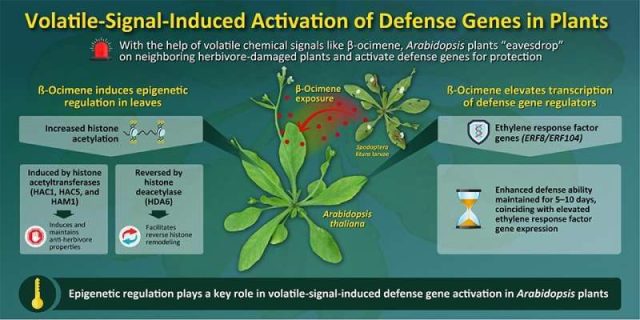17
Mar
Are Your Plants “Talking”? New Study Finds Plants Communicate and Prepare Defenses when a Predator Is Nearby

(Beyond Pesticides, March 16, 2022) Pest damaged plants release volatile chemical “scents” that alert other nearby plants of potential predators and give them time to prepare their defenses, according to research recently published in Plant Physiology by researchers at Tokyo University of Science. The findings have important implications for agriculture, including new practices that utilize this novel process. “The effective use of plants’ natural survival strategies in production systems will bring us closer to the realization of a sustainable society that simultaneously solves environmental and food problems,” says study coauthor Gen-ichiro Arimura, PhD.
Budding research conducted since the turn of the century has discovered and confirmed that plants can communicate through specific volatile organic compounds (VOCs). These compounds, referred to by researchers as “infochemicals,” can act as airborne signals that an herbivore danger is in the vicinity. Not only can plants within the same species communicate, there is evidence that plants will react to infochemicals produced by different species the other plant cannot produce, and may never have encountered. A recent experiment found, for instance, that soybean plants grown near mint are better able to withstand pest pressure by “eavesdropping” on VOCs produced by mint. Likewise, corn and tomato plants grown near tobacco that has emitted the VOC β-ocimene have been shown to produce defenses that indirectly attract parasitic wasps.
Authors of the current study suspect that plant defense responses to infochemicals produced by nearby plants is initiated by epigenetic changes. “Surrounding undamaged plants exposed to odors emitted from plants eaten by pests can develop resistance to the pests. Although the induction of the expression of defense genes in odor-responsive plants is key to this resistance, the precise molecular mechanisms for turning the induced state on or off have not been understood. In this study, we hypothesized that histone acetylation, or the so-called epigenetic regulation, is involved in the phenomenon of resistance development,” explains Dr. Gen-ichiro Arimura.
Epigenetic changes are those that turn on or off the expression of certain genes in response to external stimuli. To test their theory, researchers exposed thale cress (Arabidopsis thaliana), a small flowering plant in the brassica family often used as a model test organism, to the infochemical VOC β-ocimene. The tobacco cutworm (Spodoptera litura), a common moth pest, was subsequently introduced and allowed to feed on the thale cress. Results showed that A. thaliana plants did not respond significantly to lower levels of β-ocimene, but did respond to a higher amount that would be equivalent to that emitted by other plants (such as lima beans, or cotton). At this level, tobacco cutworm larvae exhibited significantly lower weight gain than control plants unexposed to known plant infochemcials. This enhanced defense was sustained for a period of roughly five days, generally no longer than 10.
Gene sequencing and analysis was able to follow a trail of histone acetylation, an epigenetic modification that can activate or repress gene expression, and found increased expression of defense gene regulators after VOC exposure. Scientists were able to pinpoint certain plant enzymes as responsible for activation of plant defense mechanisms.
According to a Tokyo University of Science press release, researchers are “ecstatic” to find the connection to epigenetics. The authors indicate that the process has the potential to be applied to organic agricultural systems, increasing plant resiliency, and reducing dependence on hazardous pesticides.
There is immense untapped potential in the natural processes occurring right under our noses in agricultural fields. While chemical-dependent industrialized agriculture focuses on simplifying the landscape with man-made synthetic chemicals that harm pest and predator alike, organic farmers and incentivized to leverage the work nature is already doing, subsequently growing a safer, more sustainable food crop. Take action today to ensure organic maintains its integrity and carries along the spirit of continuous improvement by submitting a comment to the National Organic Standards Board.
All unattributed positions and opinions in this piece are those of Beyond Pesticides.
Source: Tokyo University of Science press release, Plant Physiology
Photo Source: Tokyo University of Science press release










